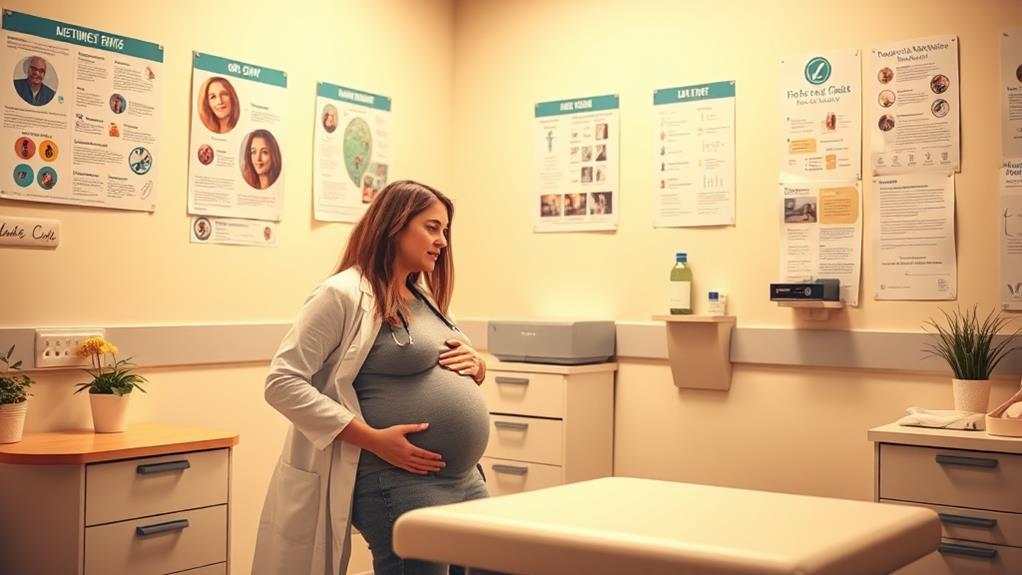When you're expecting, it's easy to feel overwhelmed by the flood of information and opinions surrounding pregnancy. You might find yourself wondering which guidelines are backed by science and which are simply myths that could mislead you. For instance, did you know that not all seafood is off-limits, or that the idea of eating for two isn't exactly accurate? Understanding these facts can make a significant difference in your pregnancy journey. As you explore the nuances of these common beliefs, you'll uncover insights that could transform your experience.
Understanding Pregnancy Myths

When it comes to pregnancy, it's easy to get caught up in the myths that surround it. You might hear that pregnant women should "eat for two," but that's not quite right. You only need an extra 200-450 calories a day, focusing on healthy foods instead of piling on the quantity.
And let's talk about alcohol. Some folks might say a little is okay, but medical experts agree there's no safe amount during pregnancy.
Then there's exercise. You may think you should avoid all physical activity, but that's a myth too! Most pregnant women can safely stay active, which is great for your health.
Importance of Accurate Information
Misinformation can lead to confusion and anxiety during pregnancy, making it vital to seek accurate information. When you're expecting, you might hear all sorts of advice, some of it helpful, and some not so much. Many common myths come from cultural beliefs or personal stories rather than facts. That's why it's super important to trust medical sources.
Consulting with qualified healthcare professionals, like OB-GYNs, means you'll get personalized advice based on real evidence tailored to your situation. It's like having your own pregnancy cheerleader!
Plus, being aware of these myths can empower you to ask questions and seek accurate information. This knowledge can lead to healthier pregnancies and outcomes, which is what everyone wants, right?
Engaging with reliable resources, books, and educational materials can help you understand pregnancy better. You'll find clarity on important topics, helping to dispel those pesky myths that can cause worry.
Dietary Needs During Pregnancy

During pregnancy, your dietary needs change significantly to support both you and your growing baby.
You'll want to increase your caloric intake by about 200 to 450 calories a day, but don't worry—this doesn't mean you need to indulge in junk food! Focus on nutrient-dense foods like vegetables, fruits, whole grains, and lean proteins. These will give you both energy and essential nutrients.
Now, let's talk about vitamins. You might need extra folic acid and iodine, so checking with your OB-GYN for personalized advice is a smart move.
And while you're planning those meals, steer clear of high-mercury fish like tilefish and swordfish. Instead, enjoy omega-3-rich options like salmon and sardines, which are great for you and your baby's brain development.
Caffeine? Keep it to about 200 mg a day, which is roughly one 12-ounce cup of coffee. Too much caffeine isn't the best idea during pregnancy.
Alcohol Consumption Guidelines
Navigating the guidelines for alcohol consumption during pregnancy is crucial for the health of both you and your baby.
It's important to know that there's no safe amount of alcohol during this time. Even a little can lead to serious issues like lifelong developmental problems for your little one.
The Centers for Disease Control and Prevention (CDC) strongly advises that you completely abstain from alcohol. This helps prevent fetal alcohol spectrum disorders, which can affect your baby's brain development and lead to physical and learning challenges.
If you're having a tough time with alcohol use while pregnant, don't hesitate to reach out for help.
There are healthcare providers ready to support you with resources for quitting. Plus, there are plenty of educational materials and programs that can help you understand the risks of alcohol consumption during pregnancy.
Caffeine Intake Recommendations

Caffeine intake during pregnancy can be a bit confusing, but understanding the guidelines can help you make informed choices. You can safely consume up to 200 mg of caffeine per day, which is about the same as 12 ounces of coffee. So, if you love your morning brew, you're in luck!
Moderate caffeine consumption doesn't increase the risk of miscarriage or preterm birth, according to current research. However, keep in mind that caffeine isn't just in coffee. It's also in tea, chocolate, and some soft drinks, so you'll want to monitor your total daily intake from all sources.
Everyone's body reacts a bit differently to caffeine, so it's smart to chat with your healthcare provider for personalized advice. They can help you figure out what's right for you.
While enjoying your favorite caffeinated drinks, remember that excessive caffeine consumption during pregnancy should be avoided. It's all about balance, so indulge in moderation and savor those sips!
After all, pregnancy is a beautiful journey, and staying informed can help you enjoy it even more.
Pregnancy Timing Considerations
Understanding the timing of pregnancy can significantly impact your journey to parenthood. When you're trying to get pregnant, it's important to think about pregnancy timing considerations.
For starters, due dates are just estimates; babies often arrive before or after the expected date. If your little one decides to be fashionably late, that's okay too—post-term pregnancy is defined as going two weeks beyond the due date.
If you're over 35, you might be at a slightly higher risk during pregnancy, but many women have healthy pregnancies and deliveries. Staying in touch with your OB-GYN can help manage any potential complications, so don't skip those appointments!
Another key factor is understanding your menstrual cycle, especially the timing of ovulation. This knowledge can boost your chances of conceiving.
Remember that pregnancy is divided into three trimesters, each with its own milestones and risks.
In a nutshell, being informed about pregnancy timing considerations can help you navigate this exciting journey. Plus, it'll give you a better idea of what to expect as you prepare to welcome your new baby into the world!
Fertility and Irregular Cycles

While irregular menstrual cycles can feel concerning, they don't always mean you're facing fertility issues. Many women experience irregular cycles due to hormonal imbalances, which can be influenced by stress, sleep, or even how much you exercise. It's not the end of the road!
Certain conditions, like Polycystic Ovary Syndrome (PCOS), can cause irregular cycles and might affect your fertility, but don't lose hope! Many women with PCOS can still conceive with the right management.
Another big player in the fertility game is age. As you get older, especially past 35, your chances of conceiving can decrease, so keep that in mind.
Also, lifestyle choices matter. If you smoke or don't maintain a healthy weight, it might impact your fertility rates. So, a balanced lifestyle can be super helpful when trying to conceive!
If you're dealing with irregular cycles, tracking your ovulation can boost your chances of getting pregnant. You can use methods like checking your basal body temperature or using ovulation predictor kits.
It's all about finding what works for you! Keep smiling and stay hopeful!
Bleeding and Miscarriage Insights
Bleeding during early pregnancy can be alarming, but it's important to remember that it's not always a sign of a miscarriage. In fact, vaginal bleeding affects 20% to 40% of pregnant women in their first trimester. That's a pretty big number!
Early pregnancy bleeding can happen for various reasons, like implantation, hormonal changes, or even cervical irritation. So, don't panic just yet!
While it's true that miscarriage occurs in about 10% to 20% of known pregnancies, often due to genetic issues with the fetus, not all bleeding indicates a problem. If you experience any bleeding, it's crucial to consult your OB-GYN for proper assessment. They can help you understand what's going on and give you the support you need, which can really ease your worries.
Understanding why bleeding happens can help you distinguish between normal occurrences and signs of complications. So, next time you see a little red, remember that it could just be your body adjusting to all the changes.
Stay calm, reach out for help, and take care of yourself! You're doing great!
Breastfeeding Support and Challenges

Navigating the world of breastfeeding can be a challenging yet rewarding experience for new mothers. It's common to feel a mix of excitement and worry, especially if you're struggling with latch difficulties or sore nipples. Many new moms find it helpful to work with lactation consultants who can teach you proper positioning and techniques.
You're definitely not alone—about 70% of moms in the U.S. start breastfeeding, but only around 35% stick with exclusive breastfeeding for the first three months. That shows just how important support is!
The World Health Organization recommends exclusive breastfeeding for the first six months, which can help your baby grow strong and healthy. If you're worried about your milk supply, don't hesitate to reach out to healthcare providers. They can offer guidance and reassurance.
Plus, there are tons of resources out there, like support groups and helplines, ready to help you tackle any challenges. So, whether you're celebrating a successful feeding or facing a bump in the road, remember that breastfeeding is a journey—one that you don't have to travel alone!
Postpartum Health Awareness
As you transition into motherhood, it's vital to be aware of the unique postpartum health challenges that can arise. After giving birth, your body goes through a lot of changes. You might feel sore, tired, or just plain weird, and that's completely normal!
Many women experience the "baby blues," which can bring mood swings and emotional ups and downs. This affects about 50-80% of new moms but usually goes away within two weeks.
However, keep an eye out for more serious postpartum health challenges, like postpartum depression, which can affect up to 15% of moms. If you're feeling overwhelmed, don't hesitate to reach out for support.
Having a strong support system of partners, family, and friends can make a huge difference in your recovery.
Regular OB-GYN Visits

Regular visits to your OB-GYN are crucial for maintaining your overall health, whether you're planning to start a family or not. It's recommended that all women schedule regular OB-GYN visits every year, no matter their childbearing status. These check-ups help monitor your health and catch any potential health issues early on.
If you're pregnant, your visit schedule changes a bit. You should see your OB-GYN every four weeks during the first 28 weeks of pregnancy, then every two weeks until you hit 36 weeks, and finally, weekly until you deliver. That may sound like a lot, but these appointments are vital. They allow your doctor to track fetal development and manage any complications that might pop up.
After childbirth, don't forget about follow-up visits! They're super important for checking on your physical and mental health, ensuring you're recovering smoothly.
Cancer Screening Necessities
Maintaining your health isn't just about regular OB-GYN visits; it also involves staying on top of cancer screenings. You might be wondering, what're these cancer screening necessities?
Well, for starters, women should begin cervical cancer screenings, or Pap smears, at age 21. Depending on your age and health history, the frequency may change, so it's best to chat with your doctor.
Starting at age 40, regular mammograms are recommended to screen for breast cancer. If you have family history or other risk factors, you might need to start earlier. That's why discussing your family history with your healthcare provider is super important!
Ovarian cancer is a sneaky one; it often shows no symptoms at first. So, keep an eye out for signs like unexplained bloating, pelvic pain, or changes in appetite.
Preconception Health Planning

Planning for a healthy pregnancy starts well before conception, making preconception health planning crucial.
You'll want to focus on establishing a balanced diet that's rich in essential nutrients. Folic acid and iodine are particularly important, as they help your baby develop and can prevent birth defects. It's recommended that women of childbearing age take prenatal vitamins with at least 400 micrograms of folic acid daily, starting at least a month before you try to conceive.
Keeping a healthy weight is also key. Whether you're underweight or overweight, it can lead to complications like gestational diabetes or preterm birth. Plus, regular check-ups with your OB-GYN can help you assess your reproductive health and manage any existing health issues.
Don't forget about lifestyle changes! Quitting smoking and cutting back on alcohol and caffeine can really boost your fertility and increase your chances of a smooth pregnancy.
Think of preconception health planning as setting the stage for your little one. You wouldn't want to throw a party without a plan, right? So, get ready to make some healthy choices that'll benefit both you and your future baby!
Myth: Eating for Two
Many people believe that when you're pregnant, you need to "eat for two," leading to the idea that you should double your caloric intake. But that's a myth! In reality, you only need about 200-300 extra calories a day for a healthy pregnancy. So, no need to go crazy with double helpings!
While it might sound tempting to indulge, excessive weight gain can lead to complications like gestational diabetes or even make a cesarean delivery more likely. Instead of focusing on eating for two, think about what you're eating. A balanced diet filled with nutrient-rich foods like fruits, veggies, whole grains, and lean proteins is super important for both you and your baby.
Don't stress about cutting out foods completely, either! That can limit essential nutrients your little one needs for development. Instead, prioritize the quality of your meals.
Think of it this way: it's not about how much you eat, but rather what you eat. So, enjoy your pregnancy and make those food choices count! Remember, it's all about nourishing both you and your growing baby, not just filling up on calories.
Myth: No Exercise Allowed

Believing that exercise is off-limits during pregnancy can lead to unnecessary fears about physical activity. The truth is, exercise isn't only safe but also beneficial for you and your growing baby!
In fact, the American College of Obstetricians and Gynecologists (ACOG) recommends that pregnant women get at least 150 minutes of moderate-intensity exercise each week. That's just a little over 20 minutes a day—totally doable!
You can often stick to your pre-pregnancy exercise routine with some adjustments. Think about activities like walking, swimming, or prenatal yoga.
These are great ways to stay fit and keep your spirits up. Plus, regular exercise can help ease common pregnancy discomforts, like back pain or fatigue, and even prepare your body for labor and delivery.
Myth: No Sex During Pregnancy
When it comes to intimacy during pregnancy, there's a common myth that sex should be avoided altogether. The truth is, sex during pregnancy is generally safe for most couples. Unless your healthcare provider says otherwise due to specific medical conditions, you can keep the spark alive!
In fact, sperm contains prostaglandins, which may help soften the cervix and could possibly aid in labor. So, who knew that some baby-making magic might actually help with labor?
Many couples enjoy a healthy sex life throughout pregnancy. It's important to communicate openly with your healthcare provider about any concerns, so you can feel comfortable and informed.
Remember, myths about sex during pregnancy often come from misunderstandings and not having the right information. This can lead to unnecessary worry for expecting parents.
And hey, whether you're wondering about the sex of your baby or just trying to maintain that connection, intimacy can be a wonderful part of your relationship during this time.
Myth: Hair Dye Safety

Despite common concerns, using hair dye during pregnancy is generally considered safe for most women. Many hair dyes are low in harmful chemicals, making hair dye safety a priority.
However, it's recommended to wait until after the first trimester to dye your hair just to be extra careful.
Before you dive into changing your look, consider doing a patch test. This simple test helps you spot any allergic reactions, which can be more likely while you're pregnant.
It's always best to consult with your hairstylist too—they can give you tips on safer options and techniques for coloring your hair.
Myth: Hot Tubs Are Dangerous
Many expectant mothers worry that using hot tubs is dangerous, but the truth is a bit more nuanced. Sure, hot tubs can be enjoyable and relaxing, but there are some important things to keep in mind.
For starters, if the water temperature exceeds 101°F, it's best to steer clear. High temperatures can increase the risk of neural tube defects in your growing baby, especially during the first trimester.
Now, don't panic! You can still enjoy warm baths, just keep an eye on the temperature to avoid overheating. Staying well-hydrated while soaking is crucial too. So grab a glass of water while you're lounging in those bubbly delights!
Also, it's always smart to check in with your healthcare provider before hopping into a hot tub or any heated water source. They can give you personalized advice that ensures both you and your baby stay safe and sound.
Myth: Arms Over Head Risks

You've probably heard that keeping your arms overhead during pregnancy could be risky, but that's actually a myth.
Reaching your arms up is generally safe and doesn't pose significant arms over head risks for your baby. In fact, movement and stretching are encouraged because they help with your overall comfort and mobility.
Some people worry that reaching up might cause the umbilical cord to wrap around the baby's neck.
But here's the scoop: umbilical cord wrapping happens in about 40% of births, and for most babies, it's not a problem at all!
Most of the time, these cases are non-problematic and don't cause any issues.
Myth: Gender Prediction Accuracy
When it comes to predicting your baby's gender, relying on old wives' tales can lead you astray. You might hear that if you crave salty snacks, you're having a boy, or if your belly's shaped like a watermelon, it's a girl. The truth? These gender prediction methods don't have any scientific backing!
The most reliable ways to find out your baby's sex are through ultrasound, usually around 19-20 weeks, and non-invasive prenatal testing (NIPT) starting at just 10 weeks.
But even ultrasound isn't foolproof. The technician's judgment and the baby's position can affect the results, making it not always 100% accurate. Many parents find it exciting to wait until the big day to discover their baby's gender. It adds a little suspense to the whole experience!
While engaging in gender prediction can be a fun way for friends and family to join in, remember that it's just a game without real science behind it. So, don't take those old tales too seriously. Enjoy the journey, and embrace the surprise when your little one finally arrives!
Myth: Caffeine Must Be Eliminated

The belief that you must completely eliminate caffeine during pregnancy is a common misconception. In reality, you can enjoy moderate amounts of caffeine, which is generally considered safe. Most experts recommend limiting your intake to about 200 mg per day—that's roughly equivalent to 12 ounces of coffee. So, if you're a coffee lover, there's good news!
Research shows that moderate caffeine consumption doesn't significantly increase your risk of miscarriage or preterm birth. That means you can still sip your morning brew without feeling guilty.
Just remember, caffeine sneaks into other foods and drinks too, like tea, chocolate, and even some soft drinks, so keep an eye on your total intake.
It's important to note that eliminating caffeine entirely isn't necessary for most pregnant women. You can enjoy a little pick-me-up here and there!
However, it's always a smart idea to chat with your healthcare provider about your specific caffeine limits. After all, every pregnancy is unique, and they can help guide you.
Myth: Seafood and Soft Cheese Risks
Many people believe that all seafood and soft cheeses are off-limits during pregnancy, but that's not entirely true. You can still enjoy some delicious seafood options! It's important to avoid high-mercury fish like shark, swordfish, and king mackerel because they can harm your baby's development. Instead, go for low-mercury fish like salmon, sardines, and trout. They're not just safe; they're packed with omega-3 fatty acids that are great for both you and your little one!
Now, when it comes to soft cheeses, you need to be a bit picky. Soft cheeses made from unpasteurized milk, like Brie and feta, can carry listeria, which isn't good news during pregnancy.
But don't fret! If you stick to soft cheeses made from pasteurized milk, you're in the clear. Pasteurization zaps those harmful bacteria right out.
And remember, cooking seafood properly is key. Make sure your fish is cooked to an internal temperature of 145°F.
Myth: Heartburn and Baby Hair

Heartburn during pregnancy often leads to the belief that it indicates your baby will have a full head of hair, but this notion has no scientific basis.
It's a common myth that many expectant parents hear, and it can cause unnecessary worry. In reality, heartburn is usually caused by hormonal changes and that growing uterus pressing on your stomach, not the amount of hair your baby might have.
Studies have shown that while many pregnant women experience heartburn, there's no real connection between how much heartburn you feel and your baby's hair at birth.
So, if you're feeling that uncomfortable burn, don't stress about it meaning your baby will have a luxurious mane.
Instead, focus on managing those heartburn symptoms! You can make dietary changes or seek medical advice to find relief.
This way, you can improve your comfort without fretting over your baby's potential hairdo. Understanding that heartburn is a frequent symptom during pregnancy can help you relax.
After all, whether your little one has a lot of hair or just a few wisps, they'll still be adorable!
Myth: Blissful Motherhood After Birth
Blissful motherhood is often portrayed in movies and social media, but the reality can be quite different. Many new moms find themselves feeling a whirlwind of emotions after giving birth. While you might expect joy and happiness, it's common to feel anxiety, sadness, and fatigue too. This isn't just a myth; it's a fact!
In fact, around 70-80% of new mothers experience what's known as the "baby blues." About 10-15% may even develop postpartum depression, which can be tough to handle.
Hormonal changes, sleepless nights, and the stress of caring for a tiny human all pile up, making adjustments tricky. So, if you're not feeling the bliss, don't worry—you're not alone!
It's super important to seek help and chat openly about your feelings. Support from your partner, family, and healthcare providers can make a big difference during this time. Remember, taking care of your mental health is just as vital as caring for your newborn.
And don't forget those follow-up visits; they're crucial for spotting any postpartum issues early on. Motherhood's a journey, not just a fairytale!
Myth: OB-GYN Visits Are Unnecessary

When it comes to pregnancy, some might think that OB-GYN visits are just an unnecessary hassle, but that's far from the truth. These appointments are super important! Regular OB-GYN visits help keep both you and your baby healthy by checking for any potential complications.
The American College of Obstetricians and Gynecologists recommends that you have your first visit as soon as you confirm your pregnancy, ideally by the 8th week.
During these visits, you'll get routine screenings and tests, like ultrasounds and blood tests, which are crucial for tracking how your baby's developing. Plus, follow-up visits give you a chance to discuss any symptoms and adjust care plans if needed. It's like having a personal cheerleader supporting you through your pregnancy journey!
If you skip these appointments, you might miss out on catching health issues early on, which isn't good for you or your little one.

